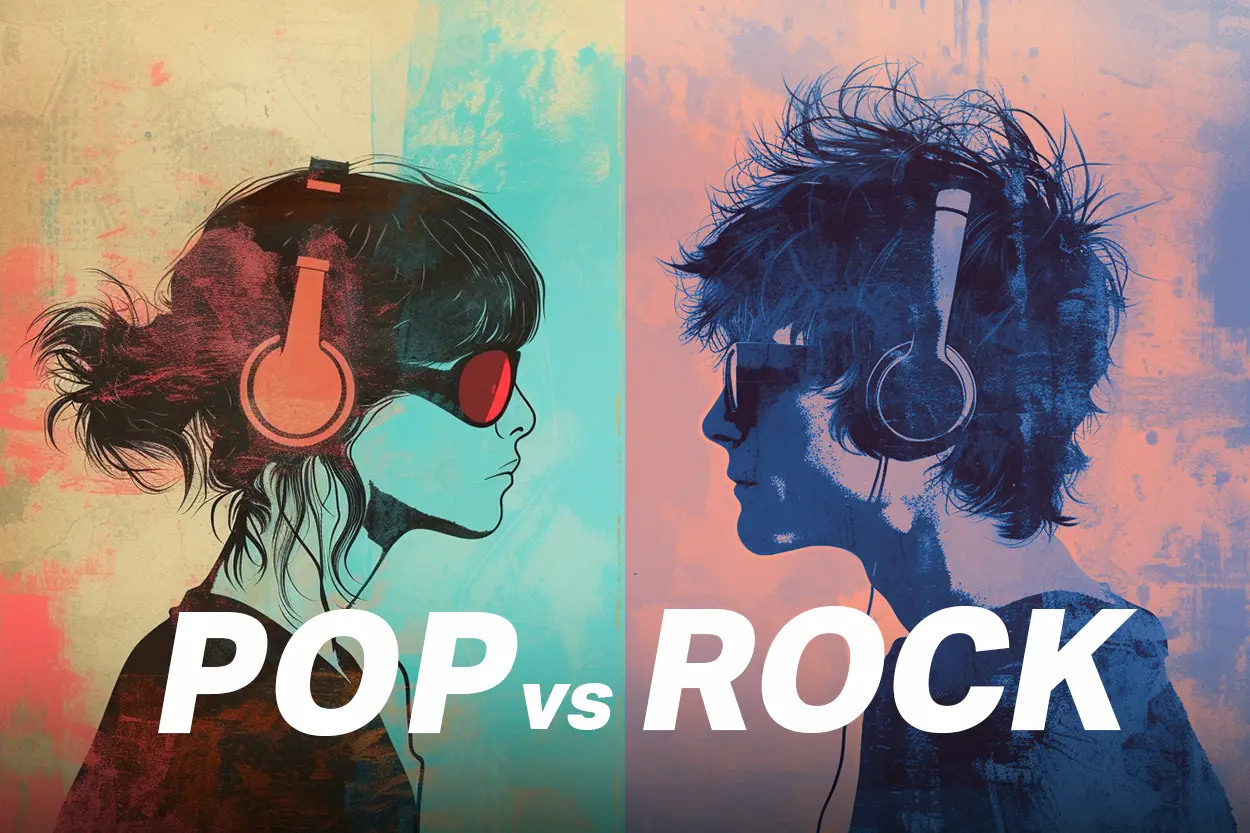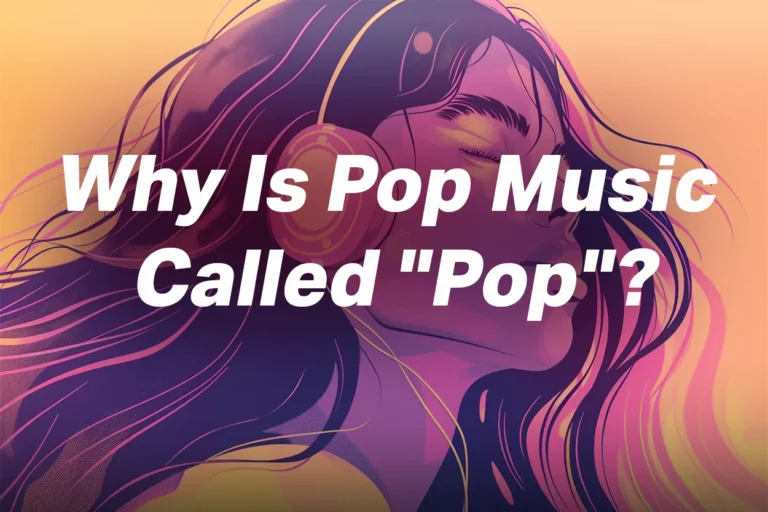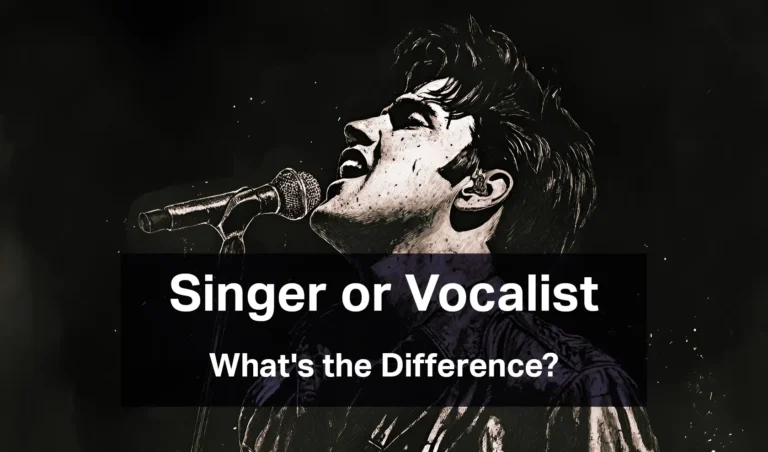POP vs ROCK: What Is The Real Difference
Pop vs Rock. It seems like there have always been music fans arguing which one is better. Even though if you ask the same fans – what is the difference between the two genres, not everyone will be able to explain.
But there is indeed a difference. And no, I am not going to use a simple answer: “it just sounds like Pop/Rock“. You can actually tell how these genres differ. In short:
Rock music is generally more complex. Both in terms of its sound, melody structure and its topics/lyrics. Pop music is usually simpler.
But music being more complex/simple doesn’t equal to it being better or worse. It’s just the way it has been created, composed and performed. Moreover, as with all generalizations there’s plenty of exceptions.
You can easily find examples of songs that are the opposite of the above definition. So it’s not a competition of what genre is better. You listen to what you want and enjoy most. But if you are interested in nuances of theese music genres, I’m happy to share my thoughts.
What is Pop music?
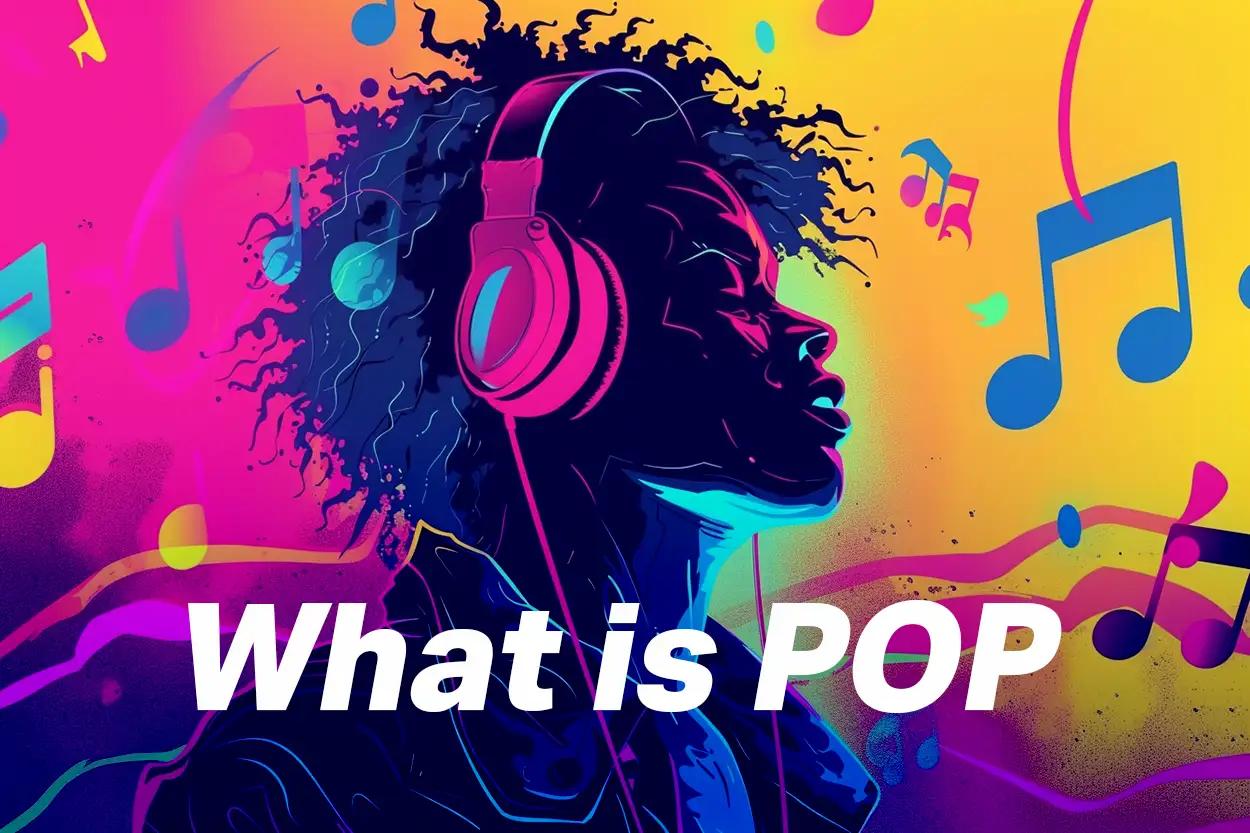
If you read something like Wikipedia, the article there will tell you that (I’ll summarize it for you): Pop music, originating in the mid-1950s in the US and UK, primarily includes short to medium-length songs with repeated choruses and hooks, often adopting the verse-chorus structure and rhythms suitable for dancing. And that it evolved from rock and roll, distinguishing itself by becoming more commercial, ephemeral, and accessible, while borrowing elements from various styles like rock, urban, and Latin.
And while this makes sense, I believe there’s an easier way to explain what Pop genre is. The idea is to break the definition into two parts. One part is about “How Pop music sounds“. And the other part is “What Pop songs are about“. Let’s take a look at these tow parts.
How Pop music sounds
The sound of Pop music is not supposed to be too complicated. The melody is (or the beat) almost always very distinguishable and catchy. It usually goes through the whole composition. In fact the repetitions are quite common as well. The vocals are typically in close tandem to the melody. This makes the overall sound light and easy to follow.
This is why pop music typically gains higher popularity compared to other genres. It’s just that more people can perceive it faster and comprehend it easier.
What Pop songs are about
Of course because the Pop genre as a whole is very big, so are the number of topics covered in pop songs. But when compared to other genres you can in fact point some general trends. Pop music usually focuses on personal story, like love and relationships. It often reflects the performer’s inner experiences.
What it rarely does is dwell into more heavy, hard pressed, unspoken or controversial social topics. For example issues like drugs, death, life struggles, political narratives, wars etc., These are not as prevalent in pop lyrics.
What Is Rock Music?

Rock music, originating in the late 1940s and early 1950s in the United States, evolved from rock and roll, drawing heavily from blues, rhythm and blues, and country music, along with influences from jazz, classical, and folk. Rock music has diversified into numerous styles over the years. Nowadays it has dozens of sub-genres, so anyone can find something they like.
And just like with Pop, I can explain what this genre is by dividing it into two parts: “How Rock music sounds” and “What Rock songs are about“. Let’s go through each part quickly.
How Rock music sounds
Rock music in general is rather complex in the way it’s played and the way it sounds. You typically have multiple instruments. Each of them can have separate highlights and distinctive solo moments. This results in complex musical structures. The rock sound often relies on the use of electric guitars, bass, drums, and a verse-chorus form. It has multiple layers and can be described as loud, heavy or fast.
The vocals do not necessarily follow the instruments perfectly. Rock musicians often use “screaming”, “growl” techniques. But they do not shy from pulling off high notes and displaying impressive vocal ranges either.
This is one of the main differences when compared to Pop genre. Because the sound is more layered and heavy it might not be as accessible to as wide audience. Or at least not to a such degree as Pop music.
What Rock songs are about
Thematically Rock music evolved significantly since its inception in the mid-20th century. Through many years it has explored themes beyond romantic love, delving into social and political issues, and reflecting cultural and social movements. Though the topics covered in modern rock have changed, the genre is still a potent force for cultural expression, political activism, and generating subcultures.
Because rock music was eager to explore controversial themes or topics not widely discussed in mainstream media, not everyone was ready or willing to listen to it. But those who were, became quite passionate and connected to the artists that covered such topics. The genre was always appealing to youth who were often facing all this issues and were searching for the answers or simply for a way to release all kinds of emotions.
the difference between Pop and Rock
One of the reasons why it’s not easy to pin point the difference between Pop and Rock is because there’s too many songs. Literally thousands of compositions have been created by now. There’s so much music, so many hits and albums. And all this music is extremely varying. Elements of one music genre often cross into the other. Pop music has dozens of sub-genres. Rock music gas dozens of sub-genres.
Besides that, artists who are generally considered to be a star of one particular genre can easily make songs that don’t fit in their respective genre. So the borders are often blurry. And that’s fine. The more varied music we have, the better. But if I were to summarize the differences between Rock and Pop, I would suggest such a characterization:
| Pop Music | Rock Music |
|---|---|
| Characterized by catchy melodies and repeated choruses and hooks. | Characterized by complex multi layered musical structures. Electric guitars, drums bass are often played. |
| Songs are short to medium in length, with a structure that often adheres to the verse-chorus format. | Explores diverse song structures including longer songs. Puts a significant focus on instrumentation. |
| Aims for universal appeal, easily accessible and danceable rhythms. Maintains a polished, commercial aesthetic designed for mainstream success. | Values authenticity and musical complexity, often with a focus on live performance and instrumental prowess. |
| Borrows elements from various styles like rock, urban, dance, Latin, and country while maintaining a commercial sheen. | Has roots in blues, rhythm and blues, country music, jazz, classical, and folk. |
| Themes frequently revolve around romantic love, typically touching on other light themes. | Themes are more varied, including romantic love but also covering a wide range of social and political topics. Delivers a more intense and often rebellious message. |
| Dominated the charts and mainstream media with its broad appeal. | Has seen various phases of mainstream success but often appeals to narrower groups of listeners. |
Misconceptions about Pop and Rock music
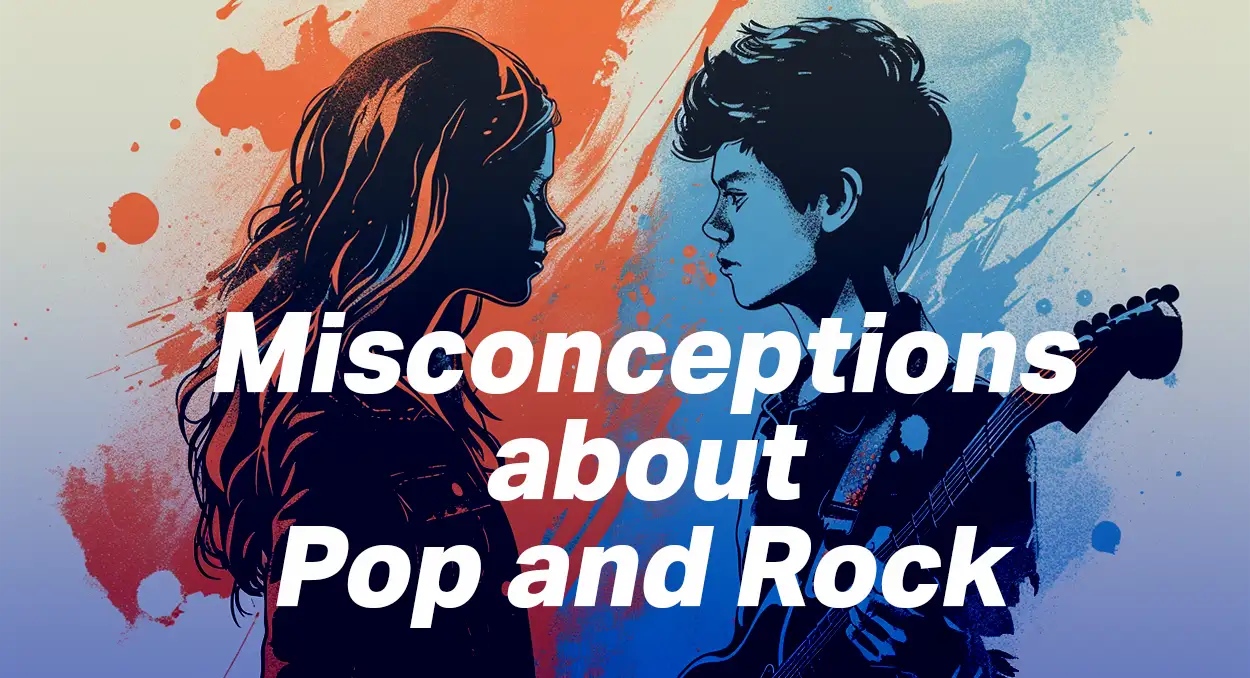
While the two genres are quite different, they also have plenty of similarities. This resulted in multiple misconceptions that formed around each style. To name a few:
- Rock music can’t be mainstream. This is far from truth, as there are way too many rock bands that became universally popular. Or at the very least had songs that belong in the rock category and which became international super hits.
- Rock music is for younger audience only. This is a common statement that has no ground underneath it really. Judging by the age of musicians themselves as well as people who attend music festivals and concerts, there is no age restriction for who is listening to rock. It is true that the wider audience consists of young people who are quick to discover new music, but the same is applied to Pop genre.
- Pop music is not serious, can’t impact the listener. This can’t be backed by anything but each separate individual’s perception. Songs have different meaning for different people and can have varying impact on the listeners. Millions of music fans who love pop genre will definitely attest that their favorite songs are very important to them and had a significant effect on their lives or emotions.
- Pop singers can’t really sing. That is not factually correct. No matter the genre, there are mediocre vocalists and there are great singers. And Pop has numerous stars with amazing vocal abilities. I mean, how would you describe Adele, Whitney Houston, P!NK, Robbie Williams, etc.?
Great Examples of Pop and Rock Songs
One thing for sure is that both Pop and Rock have numerous amazing songs, albums and artists. We have seen the genres branch out into multiple sub-genres. We have seen songs that became anthems for whole generations. We have seen true music icons and superstars performing in all possible styles.
As long as talented individuals take on music and express themselves through their songs we will always have something to listen and to enjoy.
To wrap it up I just want to give a couple example of songs from each genre. Just to end this on a really pleasant note.
And here are some awesome Rock songs:
If you are fan of Rock genre, check out Greatest Rock Songs Ever Chart. It is my custom list of TOP songs of the genre. Enjoy them all via YouTube playlist.

